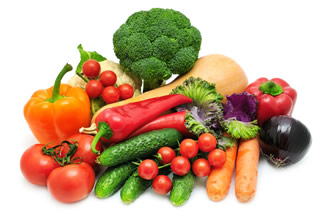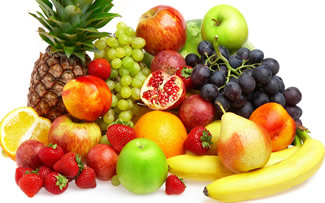Vegetables and Fruits
If your diet is low in natural fruits and vegetables it could be causing the growth of harmful bacteria which may contribute to arthritis symptoms. Whole fruits, berries, leafy greens, and vegetables are all rich in vitamins, minerals, anti-inflammatory antioxidants like Vitamin C and E, and phytochemicals. Many people are unaware that a “majority of inflammatory diseases start in your gut, as a result of an imbalanced microbiome, or that certain foods can help “’reseed’ your gut with beneficial bacteria.” Fruits and vegetables are rich in fibers that provide the beneficial bacterias that balance the gut and keep inflammation at bay. You should eat at least five, but preferably more, servings of fruits and vegetables each day. By adding more vegetables and fruits to your diet, you promote a well-functioning immune system and an inflammation-free environment.
 Most all vegetables, raw or otherwise, are great for reducing inflammation, however not all vegetables are created equal. Following is a list of the best inflammation-fighting vegetables:
Most all vegetables, raw or otherwise, are great for reducing inflammation, however not all vegetables are created equal. Following is a list of the best inflammation-fighting vegetables:
- Beets are known to reduce inflammation, contain high levels of antioxidants, fiber and Vitamin C and also protect against heart disease and cancer. Beets can be prepared in a variety of ways.
- Onions fight inflammation and also carry phytonutrient quercetin and allicin, which break down after ingestion and create the free-radical fighting chemical known as sulfenic acid.
- Bell peppers contain antioxidants, vitamins (especially Vitamin C), and also contain capsaicin, a chemical sometimes found in topical ointments and creams that reduce pain and inflammation.
- Dark, leafy, green vegetables like Collard Greens, Broccoli, Kale, Spinach, and Chard contain a large supply of Vitamin E which protects the body from those pro-inflammatory molecules cytokines.
- Bok Choy is a great anti-inflammatory food due to its high concentration of Beta Carotene and Vitamin A. Beta Carotene is an antioxidant that protects cells from damage. (One serving of bok choy contains up to 70 mg of omega-3 fatty acids which also aids in reducing inflammation.)
- A list of other vegetables that have been known to fight inflammation are:
- Carrots
- Cabbage
- Sweet Potatoes
- Brussels Sprouts
- Cauliflower
- Leeks
- Olives
- Turnip Greens
 Nearly all fruits are healthy for the body; however some fruits contain more sugar, or fructose, than others. Any type of diet that contains high sugar, is not only unhealthy, but can lead to inflammation. High sugar diets often lead to weight issues which can play a role in causing inflammation. With that being said, there is a variety of fruits that not only taste delicious but are also marvelous at reducing inflammation, and they are:
Nearly all fruits are healthy for the body; however some fruits contain more sugar, or fructose, than others. Any type of diet that contains high sugar, is not only unhealthy, but can lead to inflammation. High sugar diets often lead to weight issues which can play a role in causing inflammation. With that being said, there is a variety of fruits that not only taste delicious but are also marvelous at reducing inflammation, and they are:
- Tart Cherries are ranked as the leader of anti-inflammatory foods for now. In 2012, the Oregon Health & Science University claimed that tart cherries contain the “highest anti-inflammatory content of any food.” To see these types of benefits, researchers confirm that eating 1.5 cups of tart cherries or drinking an 8 oz. glass of tart cherry juice will provide the anti-inflammatory benefits that patients might desire.
- Tomatoes are rich in lycopene, which is known to reduce inflammation in the lungs and throughout the rest of the body. “Cooked tomatoes contain even more lycopene than raw ones, so tomato sauce works as well.”
- Different types of berries often contain anthocyanins, which give berries their rich color and also help fight inflammation: “Strawberries regulate lower-levels of C-reactive protein in the blood” and blueberries are known to “protect against intestinal inflammation and ulcerative colitis.”
- Mangos have high concentrations of Vitamin C which is known to relieve arthritis. A study of 25,000 people revealed that consuming 500-1000 mg of Vitamin C reduces a person’s risk of developing arthritis by 30%.
- Other fruits known to fight inflammation are:
- Cantaloupe
- Grapefruit
- Cranberries
- Pineapples
- Apples
- Guavas
- Kiwi
- Kumquats
- Papaya
- Raspberries
- Lemons
- Limes
- Mulberries
- Oranges
- Peaches

